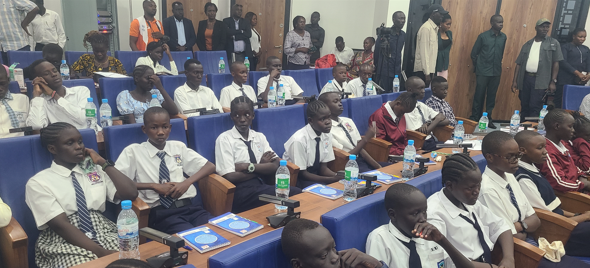As South Sudan joined the world in commemorating The International Day of the African Child on Monday, children from various schools under the South Sudan Children’s Parliament have called on the government, to prioritize children’s health, education, and nutrition by fulfilling its commitment to allocate 10 percent of the national budget to agriculture, 15 percent to health, and 10 percent to general education.
The call comes at a time when children across the country continue to suffer from malnutrition due to food shortages, largely attributed to poor resource allocation to the agriculture ministry. Additionally, access to education remains low, with many children out of school.
The International Day of the African Child is commemorated every year on 16 June and honors the courage of thousands of black South African schoolchildren who, on 16 June 1976, marched in protest against the apartheid regime’s education policies in Soweto. Hundreds of children were killed by security forces during the peaceful demonstration.
In her keynote address during the commemoration event at the National Parliament in Juba, Naomi Joseph, Speaker of South Sudan Children’s Parliament, stated that while parents play a role in their children’s lives, the government holds the greater responsibility of ensuring their welfare.
“Today, we do not only come to celebrate the International Day of the African Child, but we also come to talk about planning for children’s welfare, our welfare,” she said. “How can we be fine without that (welfare)? How can we live our lives without that? I know most of you have questions about the roles of our parents and our community leaders, that today we stand up saying our government has the biggest role to play in our welfare.”
According to Naomi, children’s welfare goes beyond access to education and includes the establishment of hospitals for all, including pregnant women.
“Our welfare is not just about being in school. Our welfare is not just about building hospitals, but it is about building hospitals for everyone to access. It is about sending everyone to school. It is about how we are going to be successful in the future,” she said. “We are the leaders of tomorrow, but are you sure we are the leaders? If you do not give the leaders food, what will they eat? We will die of hunger. If you do not send us to school, what language are we going to use to write when we become the leaders? Are we going to speak in Arabic at conferences globally? Or are we going to just be people on the street as leaders of tomorrow? Sometimes we need to think of some of these issues.”
Her sentiments were echoed by Necodemus Garang, another student and a member of the South Sudan Children’s Parliament, who noted that education, health, and food security are interconnected, and that when one is lacking, the others are affected.
“I realized that the problems within South Sudan are actually interconnected, and if the people in the health sector have issues, then children will not be able to go to school, and if people in agriculture do not have inputs, children will be hungry and not go to school,” he said.
Garang stressed that the government to ensure that food security, health, and education are all addressed collectively.
For her part, TNLA Speaker Jemma Nunu Kumba commended the children for raising the issues affecting them and pledged the government’s commitment to addressing them in the 2025/26 fiscal year budget.
“Today’s dialogue is a testament to our commitment to listening to children, empowering them, and involving them in decision-making processes,” she said. “This is already the involvement of our children in the decision-making process, because you are influencing our minds and how we should be making decisions.”
“So, the conversation is very clear, Article 17 is very clear about the right of children, and that is what should guide us,” Speaker Kumba added.
The speaker, who attended the event alongside several chairpersons of specialized committees, reiterated the TNLA’s commitment to pushing for policies that prioritize children’s rights.
Meanwhile, Samuel Chol, an activist from the Child Rights Civil Society Coalition, highlighted the declining trend in budget allocation for education. He noted that the General Education budget was SSP 81 billion (5.9%) in the 2022/2023 fiscal year, SSP 91 billion (4.3%) in 2023/2024, and decreased to 2.6% in the 2024/2025 budget—far below the government’s commitment to allocate at least 10% annually.
Chol also pointed out that the Ministry of Health, tasked with ensuring the well-being of the population, including children, has been similarly underfunded. As a result, 2.1 million children continue to suffer from acute malnutrition.
“The government of South Sudan committed to spending at least 15% of the national budget on health. This is in line with the Abuja Declaration of 2001,” he stated. “Honorable Speaker, you can see the government’s commitment of 15% and then the allocation of just 1.2%.”
The Ministry of Gender, Child and Social Welfare, which is responsible for child protection, has consistently received only 0.1% of the national budget over the past three years, raising concerns over the government’s failure to prioritize ministries responsible for upholding children’s rights.
Commemorated under the theme ‘Planning and budgeting for children’s rights in South Sudan,’ the day serves as a powerful reminder of the shared responsibility to prioritize the needs and rights of children through inclusive planning and equitable allocation of national resources.
It also calls for stronger inter-sectoral collaboration to ensure that children’s rights are realized in policy and practice.




